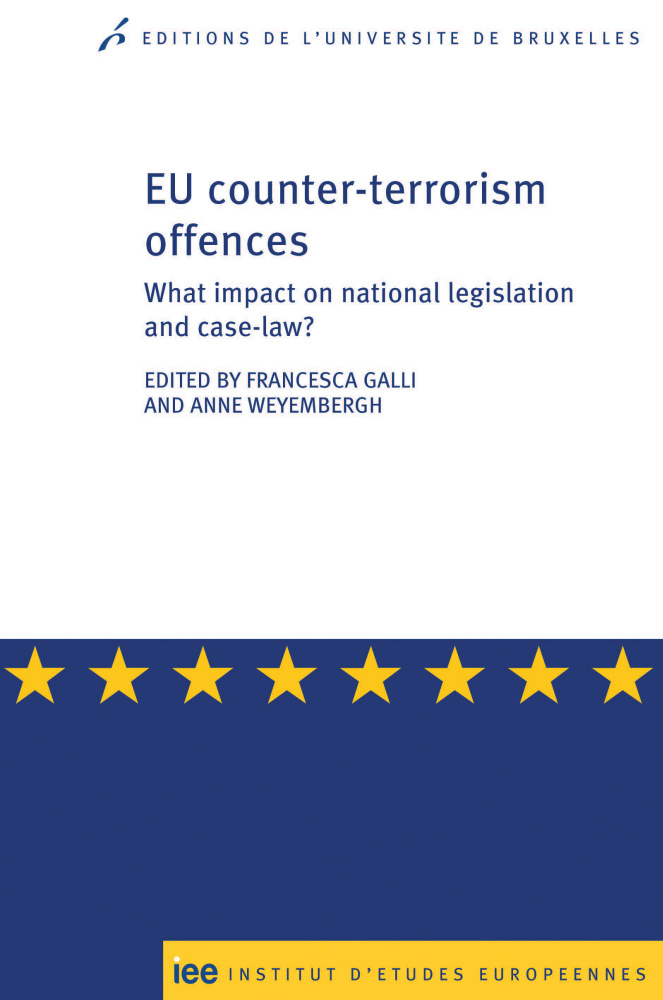EU counter-terrorism offences
What impact on national legislation and case-law?
Première édition
To several governments, modern international terrorism cannot be handled adequately within the ordinary criminal justice system. To fight terrorism (including the criminalization of certain “abstract danger”, preparatory activities such as terrorist training, membership in a terrorist organization) more effectively, criminal law had to be adapted. Lire la suite
National legislation has evolved against the background of international and European instruments. This collective book presents and discusses the latest counter-terrorism policies at the EU level, and particularly instruments for approximation in the field, namely the Framework Decision 2002/475/JHA on combating terrorism and the Framework Decision 2008/919/JHA amending the previous one. The objective is, in particular, to evaluate the impact of the introduction of a EU definition of terrorism and the three new offences of provocation, training and recruitment for terrorism purposes on the development of substantive criminal law and case law of selected EU Member States.
Following an introduction and a general critical assessment of both Framework Decisions, the first part will be devoted to the interplay between these two EU instruments and national provisions, including a study of the relevant domestic case law. Nine Member States (France, Germany, Italy, Spain, UK, Austria, Belgium, Denmark and Hungary) have been selected in order to ensure a balanced representation and particularly the division between two groups of States. The first group is made of few jurisdictions that have experienced serious and long-lasting periods of political violence and terrorism, developed specific terrorist offences and have been influential in providing a model for shaping a common European counter-terrorism strategy. The second group encompasses States that have defined terrorist offences as autonomous ones in their penal codes only when required by the 2002 Framework Decision on combating terrorism. A second and briefer part looks at the influence on European cooperation of the two relevant EU framework decisions harmonizing the terrorist offences. A third and last part is entirely dedicated to the issue of the shift towards prevention in the fight against terrorism and gathers several crosscutting reports for this purpose. The book ends with a transversal and analytical conclusion.
This book is the result of the collaboration of an international team composed of academics and researchers who are members of ECLAN (European Criminal Law Academic Network) as well as national and European experts who « practice » the relevant EU instruments on a regular basis.
Spécifications
- Éditeur
- Éditions de l'Université de Bruxelles
- Édité par
- Francesca Galli, Anne Weyembergh,
- Introduction de
- Francesca Galli, Anne Weyembergh,
- Contributions de
- Emmanuel Barbe, Martin Böse, Stefan Braum, Pedro Caeiro, Manuel Cancio Meliá, Francesca Galli, Roland Genson, Sabine Gless, Laurent Kennes, Gilles de Kerchove, Robert Kert, Henri Labayle, Katalin Ligeti, Christophe Marchand, Ulrich Sieber, Katja Šugman Stubbs, John R. Spencer, Jørn Vestergaard, Anne Weyembergh,
- Collection
- Études européennes | n° 51
- ISSN
- 13780352
- Langue
- French
- Site web ressource
- Oapen.org
- Catégorie (éditeur)
- > Droit
- BISAC Subject Heading
- LAW026000 LAW / Criminal Law
- Code publique Onix
- 06 Professionnel et académique
- CLIL (Version 2013-2019 )
- 3259 DROIT
- Subject Scheme Identifier Code
- Classification thématique Thema: Droit pénal : loi anti-terrorisme
Paperback
- Date de publication
- 27 janvier 1993
- ISBN-13
- 978-2-8004-1058-6
- Ampleur
- Nombre de pages de contenu principal : 184
- Code interne
- 1058
- Format
- 160 x 240 x 15 cm
- Poids
- 331 grammes
- ONIX XML
- Version 2.1, Version 3

